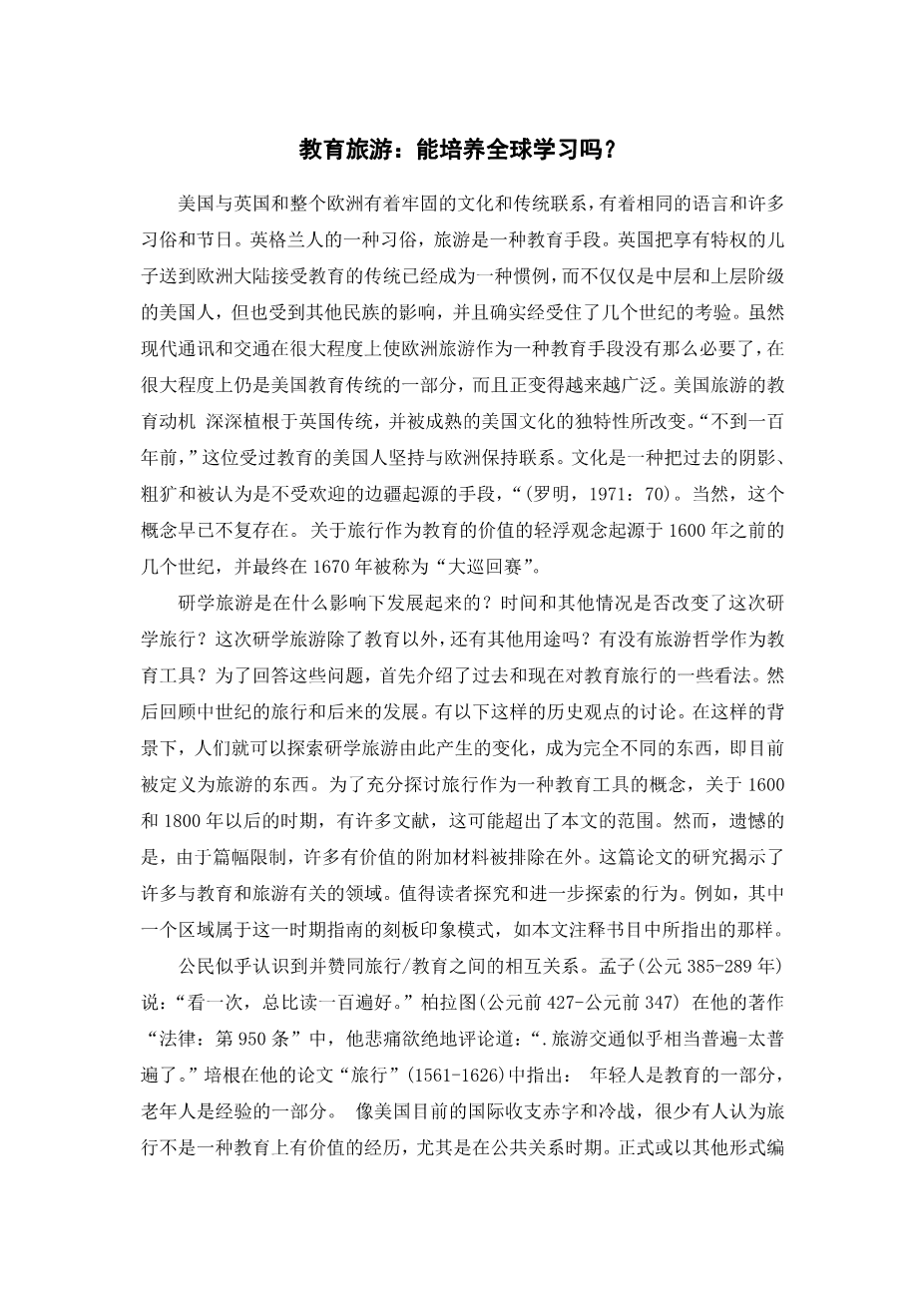American has strong cultural and traditional ties with England in particular and Europe in general, sharing the same language and a number of customs and holidays. One custom adopted from the English is the notion of travel as a means of education. The English tradition of sending her privileged sons to the Continent to extend their education had become an adopted practice, not only by middle and upper class Americans in general, but by other nationalities as well, and has indeed withstood the test of centuries. Although modern communications and transportation have largely dimmed the former necessity for European travel as a means to education, it is still very much part of the American education tradition and is becoming more widespread. American educational motives to travel are deeply rooted in the English tradition and modified by the maturing distinctiveness of the American culture. Less than a hundred years ago, The educated American insisted on contact with European culture as a means of casting into the shadows of the past, coarseness and presumed undesirability of his frontier origins. This concept is, of course, long since gone. The British idea of the value of travel as educational has its origin in the centuries preceding the 1600's and eventually in 1670 became known as The grand Tour.
Under what influences did the grand tour develop? Has time and other circumstances changed the grand tour? Did the grand tour serve purposes other than to educate? Was there a philosophy of travel as an educational device? To answer these queries, first some past and present views of educational travel are presented. Then an historical review of medieval travel and the subsequent development of the Grand Tour is discussed. From this background one then can explore the resultant change of the Grand Tour into something quite different: something that is presently defined as tourism. To adequately explore the notion of travel as an educational tool, numerous references are made regarding the periods before 1600 and after 1800, which may appear beyond the scope of this paper as the title suggests. Regretfully, however, much worthy material was excluded due only to space limitations Research for this paper uncovered numerous areas related to education and tourism indeed worthy of the reader's inquiry and further exploration. One such area, for example, pertains to the stereotypical pattern of the period's guide books as noted in the annotated bibliography of this paper.
Much of the world's learned citizens appear to recognize endorse a travel/education correlation. Mencius (AD. 385289B.C.)stated, To see once is better than to read a hundred times Plato(427BC.347 BC)ruefully commented in his book Laws. Section 950 that, "Tourist traffic appears to be fairly common rather too common. The literature is well fortified with favorable philosophies regarding travel and education. Political considerations not withstanding, such as America's current balance of payment deficit and cold wars, rare is the person indeed who believes that travel is not an educationally worthwhile experience especially when programmed into a curriculum, formal or otherwise. Some early educators actually incorporated travel into their curriculum to maximize learning. The foremost spokesman for the revolt against mere book-learning in the 1500s was the Frenchman Michel , generally known as Montaigne. He developed a pedagogy amply reflected by his saying, "A mere bookish learning is a paltry learning. Montaigne believed students needed some direct adventuring with the world, a steady and lively interplay with common folk, supplemented and fortified with trips abroad. Such contacts with mundane concerns serve not only to put an edge on the learner's faculties: they will appraise him of other people's humors, manners, customs, their politics, theology and Jurisprudence. their social system, and their public works(Meyer1972:231).
Among the least suggested impetus for travel was that of recreation. Prospect in ancient Greece promoted leisure touring but it was not until the 1500-1600 period that leisure touring formally emerged as a means of education. Roughly speaking, it was at this time that the practice of the upper-classes of sending their sons abroad as part of the educational scheme became successive,an experiment, a custom, and finally, a cultural norm. The English are for the most part credited with instituting the travel/education phenomenon. In all fairness, the system was not an exclusive of the British; it was a practice of most of Europe's privileged. Sir Henry, as British ambassador to Venice, noted in his autobiography, Life and Letters, in 1603, that travel was coming into fashion among the young nobles of Venice. The Poles, French, and others traveled to varying degrees as an extension to education; Iberians tended rather to ignore the Continent to pursue their overseas dominions. European travel paralleled the rising number of diplomatic journeys which in turn appears to occur in proportion to the degree of civilization attained by the numerous political sovereigns.
Ritchie's (2003) segmentation model of educational tourism is generally considered the benchmark for educational tourism. It helps conceptualize the overlap between education and tourism and has contributed to developing awareness of educational tourism as a niche sector. However, by employing a market segmentation approach, the model excludes sectors of the industry in which learning may be a significant activity. Pitmanetal (2010) overcome this limitation by suggesting a process approach for defining educational tourism. According to them, educational tourism can be identified by three key features:The trip is intentionally educationally focused.The style of learning is experiential.The trip is structured around an educational programme.
Pitmanetal describe educational tourism as “involving a deliberate and explicit lear
剩余内容已隐藏,支付完成后下载完整资料


英语译文共 3 页,剩余内容已隐藏,支付完成后下载完整资料
资料编号:[434456],资料为PDF文档或Word文档,PDF文档可免费转换为Word
您可能感兴趣的文章
- COVID-19时期的旅游业和可持续发展:以西班牙为例外文翻译资料
- 农民相对剥夺感对乡村旅游可持续发展的影响机制外文翻译资料
- 校园大学生的旅行行为——以亚洲某乡村大学为例外文翻译资料
- 内容旅游与地方社区响应:鹫宫的“幸运之星”和“协作动漫旅游”外文翻译资料
- 基于符号互动理论的遗产旅游资源开发与重塑——以良渚古城遗址为例外文翻译资料
- 在TikTok上映射互联网名人:探索注意力、经济和可见性劳动力外文翻译资料
- 基于社区游客视角的环境责任行为的概念和度量外文翻译资料
- 温泉小镇的再造:维希的独特案例——副标题外文翻译资料
- 基于IP理念的桐乡丰子恺文化旅游开发研究外文翻译资料
- 特殊事件对旅游业的影响及其应对措施研究——新冠肺炎疫情对全球旅游业的影响及其应对措施外文翻译资料


